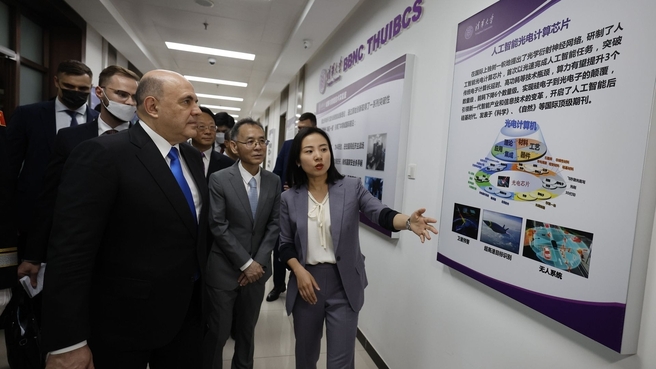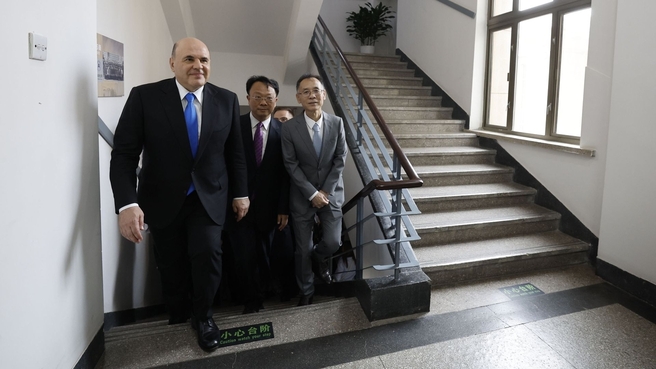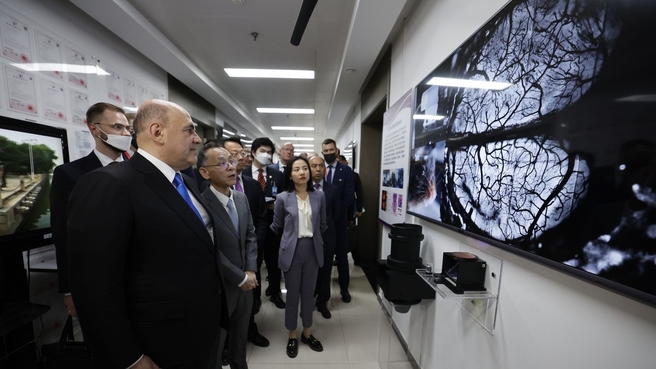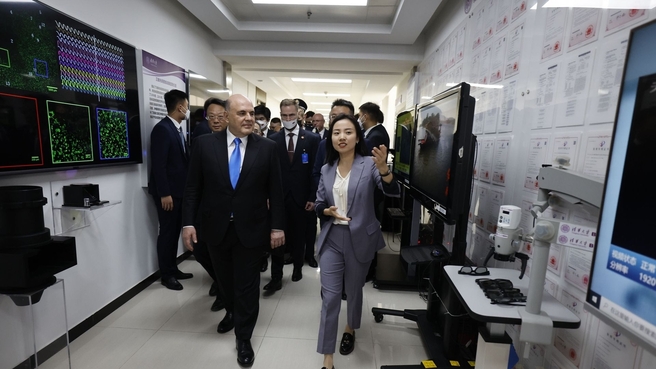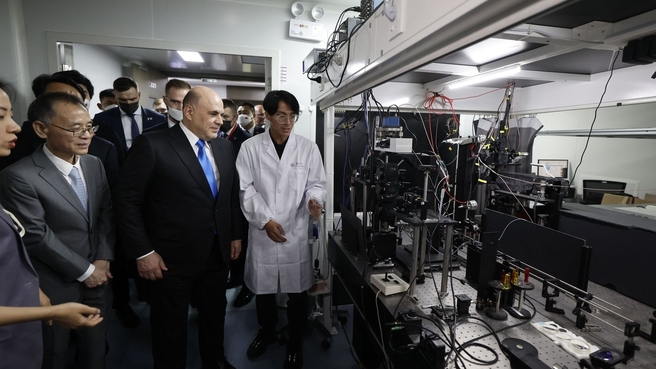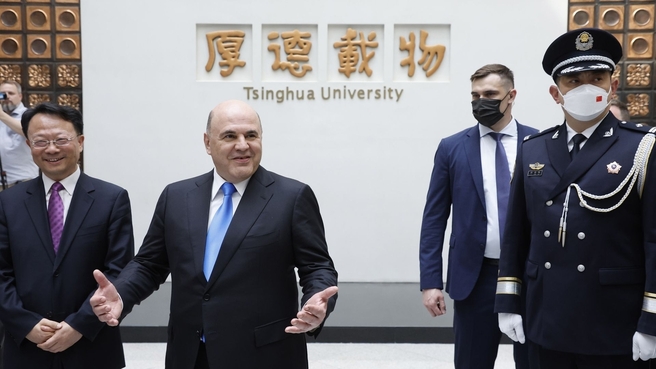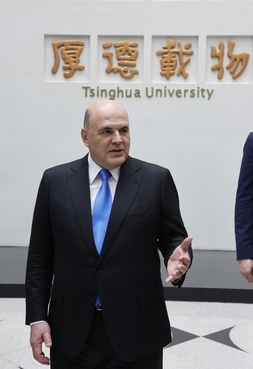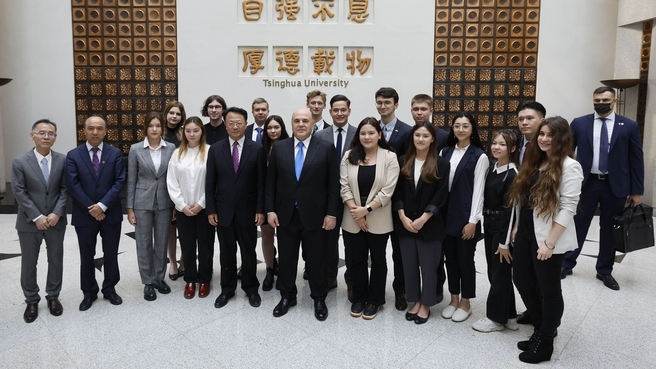Prime Minister Mikhail Mishustin saw the laboratories’ innovations and talked with Russian students and postgraduates at Tsinghua University.
Excerpts from the transcript:
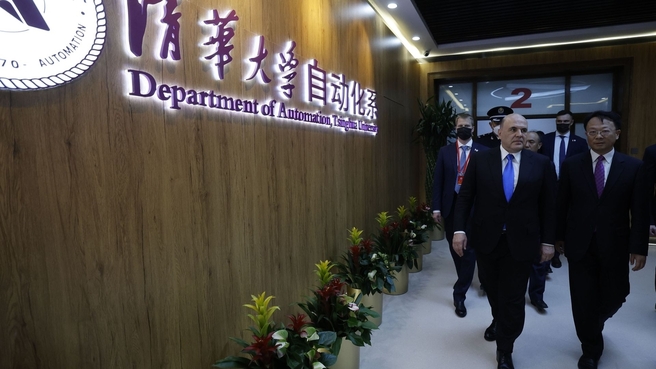
Mikhail Mishustin visited Tsinghua University in Beijing. With Tsinghua University President Wang Xiqin
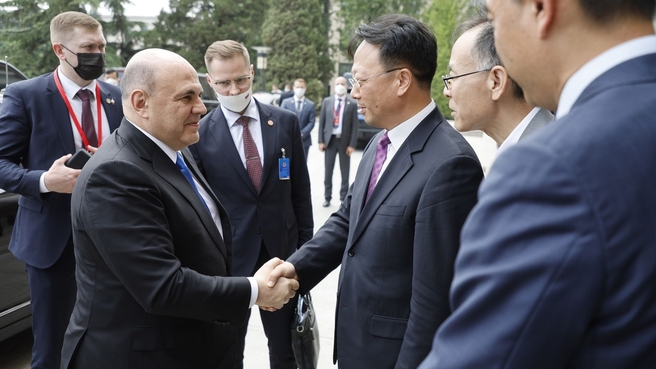
Mikhail Mishustin visited Tsinghua University in Beijing. With Tsinghua University President Wang Xiqin
Mikhail Mishustin visited Tsinghua University in Beijing. With Tsinghua University President Wang Xiqin
Mikhail Mishustin: Good afternoon. First of all, I would like to welcome all of you. Russia and China are connected with relations of brotherhood, and by deep historical roots of friendship, cooperation and mutual respect. And of course, our mutual contacts are constantly active when students from China study in Russia, and you, representatives of Russia, get an education in China. We have many joint projects. Here, at Tsinghua University, I know there are four joint projects with the Moscow State University, MGIMO University, Bauman University, and the Higher School of Economics. These are all joint projects where the students are actively working, looking for ways to interact, and continue to work and study both in China and in Russia. So, we can say that Tsinghua works in both countries: in Russia and in China. And you are our goodwill ambassadors.
Visit
-
Mikhail Mishustin lays a wreath at the Monument to the People’s Heroes in Beijing
-
Mikhail Mishustin’s meeting with representatives of the Russian business community
-
Mikhail Mishustin’s meeting with BRICS New Development Bank President Dilma Rousseff
-
Mikhail Mishustin takes part in the Russian-Chinese Business Forum
If
you have any questions, I am ready to answer them.
Nik Gu (third-year undergraduate student of the Faculty of Social Sciences) I am the communications ambassador of our university and a member of the SCO Youth Platform.
I have this question. I have been living in China for 18 years now, and I observe a deep patriotism and great pride among Chinese young people for their country, history, culture and government policies.
I would like to see the same in Russia, so that the development of soft power and a new perception of Russia in the international arena is supported and promoted at various levels.
Mr Mishustin, what do you think about this and how can this be implemented in the current circumstances?
Mikhail Mishustin: I think it is you guys, those who know Russia and study in China, who should contribute to this. You said you are an ambassador in an SCO country. So you have to talk about Russia, about our traditional values, about our families, friends, relatives. Because it is best when people hear directly from you who you are, what you are and what your country is like.
And in Russia, young people, the vast majority of our youth, are proud of their country, their culture, their rich historical roots, our achievements, and our science. And it is precisely this kind of interaction that will bear fruit. Your activity in social networks, your personal activity – all this will enable people to see and understand Russia.
And Russia and China have historical and fraternal relations.
Kirill Balbek (first-year master's student in the Faculty of Computer Science and Technology): My name is Kirill Balbek. I am a graduate of the Moscow Institute of Physics and Technology, and I am currently studying for my master's degree at Tsinghua University. I have worked on projects at the interface between science and technological entrepreneurship, namely telemedicine.
Now the relations between China and Russia, as you have noted, are fraternal and friendly. Therefore, I would like to ask: what format of interaction do you see between the leading Russian institutes, which you have listed, among others, and Chinese partners, namely scientific and industrial ones?
How can we, postgraduate students, contribute to the implementation of such programmes to develop cooperation?
Mikhail Mishustin: I will start from the end of your question. The best assistance is the results of R&D, what you do, when you can scale something up. Today we saw a wonderful laboratory, which, by the way, President Xi Jinping visited, and we were told about the scientific research, research and development work that it is doing. And with augmentation, it then applies this experience in completely different sectors: microelectronics, medicine, and space. It is the same here: these formats should, of course, be created based on the results of research, work, and scientific interests.
We now have 10 joint centres in areas such as mathematics, chemistry, agriculture, industrial formats, which complement each other in one way or another. You graduated from the Moscow Institute of Physics and Technology. I know how much interest there is in specialists from this university, including in China. And I am sure that this mutual, cross-pollination of knowledge and technologies will produce excellent results. This will also contribute to the development of industrial sovereignty, technological sovereignty, and the economy as a whole.
Ivan Timofeyev (second-year master’s student at the Faculty of Economics and Management): Mr Mishustin, my name is Ivan Timofeyev. I am a master's student at the Faculty of Economics and Management. I have a question about academic collaboration. Over the past year, I have seen a large number of Russian students, like us, who came to China to study or via exchange programmes, which is a very important component of academic cooperation between the two countries. How do you see Chinese-Russian academic cooperation in the future? What programmes or projects will the Russian side carry out to improve relations in this area?
Mikhail Mishustin: I see Dmitry Chernyshenko, our Deputy Prime Minister, looking at me. He is responsible, in particular, both for the preparation of regular meetings of the heads of the Russian Government and the Chinese State Council, and for science. He is in charge of the Ministry of Science and Higher Education, and actively works to ensure that our contacts in this area are very close.
As for the number of students, 7,500 young people from Russia are studying in China today. And this cannot but make us happy. This format of interaction is also good because the students themselves gather in associations. They do it together with universities. We have 13 such associations in a variety of areas: industrial areas, agriculture, technological sciences and medicine. And these associations hold a number of forums and meetings.
The best way is to work directly, bypassing intermediaries. And of course, to create scientific centres. To work together on large projects, such as NICA, megascience installations, where there is major international cooperation and where any format of scientific contacts with our colleagues is in demand.
And I would like to take this opportunity to invite you to the International Youth Festival, which will be held in February-March next year in Russia, where you will be able to discuss all the formats of interaction.
The best means of interaction is in-person communication. Nothing can replace in-person communication. This, by the way, was illustrated by the pandemic, this disaster that happened in the world. Everyone missed each other so much! And we can see and feel this, including from our Chinese friends – we missed face-to-face communication.
Angelica Xu (a fourth-year BA student of the Economics and Management Faculty): Mr Mishustin, my name is Angelica Xu, I am a student of the Economics and Management Faculty, and I am actively involved in public activities. I am President of the Association of Russian Students in China, and I also take part in the work of the Belt and Road Association at Tsinghua University. So, here is my question: What recommendations and advice can you offer Russian students who want to contribute actively to strengthening relations between Russia and China?
Mikhail Mishustin: My advice is very simple. First, you should respect the country where you study. You should respect and love it because people around you and their current attitude are a highly important guarantee of friendship. Of course, it is also very important when a country shares its approaches to research and studies. What can you do towards this? Of course, you should represent your Motherland, your country in a worthy way.
It is often said that data now serves as the 21st century oil, gas and platinum. This data is becoming more and more valuable all by itself, and it could pose a threat, as well. Data being processed to be abused can change specific opinions. However, nothing can change this when people maintain personal contacts, and when there is a fair and honest data provision resource. You, young people, are this resource. Maybe, I am sounding a bit complicated, but when people know you personally, nothing can replace this, neither newspapers nor social media, which are not always entirely truthful. Make friends, communicate, study, be proud of your country, and don’t forget Russia.
By the way, where are you from? Everyone here asked questions but said nothing about their home cities? What cities do you come from?
Remark: Novosibirsk.
Remark: Moscow.
Remark: Khabarovsk.
Remark: St Petersburg.
Remark: Bryansk.
Mikhail Mishustin: These are wonderful Russian cities. Ladies and gentlemen, I am delighted to see you here, and I want to say that we have some very good news for you: From now on, we will confirm university degrees, mutual recognition of qualifications, online. Mr Dmitry Chernyshenko, is that right? We have already adopted all the decisions today. I therefore hope that we will be able to confirm the degrees of our university graduates and to help them find jobs in Russia or China.
